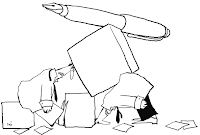After some eight years of experience, i tend to ask the following questions to myself (and may be i can help you too). By comfort zone, i dont really mean working in the same company and i really mean comfort zone - doing something you never did :-) or keep doing something different that you love to do - programming, testing, writing articles, writing books etc.
What does the experience teach? Does it teach about the concept of incremental pay hike? Or does my experience is all about eight one year of experience? Am i able to understand the classical things about computing now? At a bare minimum, does my experience help me to choose a programming language to do a specific job? Am i directed towards something and if so am i going in right direction? Am i become bankrupt of steam of learning? Am i forgetting the fact that learning is lifelong process?
Well, i reflected a lot about my state and i m quite pissed off with my actions for past one year. There weren't intellectual learning at the level i expected and i certainly feel like i m doing mundane thing. I used to write articles, i used to speak in conferences, i used to speak technically, i used to write code, i used to design and i used to share at reasonable level with others. When say "i used to", you got to understand that "i m not doing it right now".
After a long reflection, my heart says, i got to invest on two things - time and money. Of the two things, i feel like time is more important entity and it is quite difficult to buy. I want to learn new programming language such as Scala, Scheme, or Haskell. The second thing is that i would like to set up a small lab. When i say, a small lab, it is really small. Probably, x86/Linux based desktop. I want to relearn some of things that i have forgotten but this time around i want to give a strong focus on fundamentals. It is not going to be time-bound but it doesn't mean that i won't be time conscious. This time the focus is more on going deeper than wider. I want to especially do something in cloud computing space as well.
I think, this is going to be an exciting journey and for sure i ll share some of my learnings here as i go when i get something concrete.
I know what you are murmuring. Yeah, i really sounds like a freshman but it is the true state. I got to accept it and move on.





